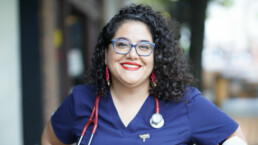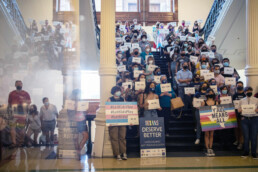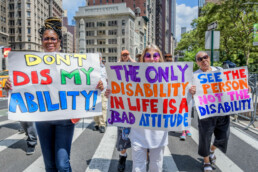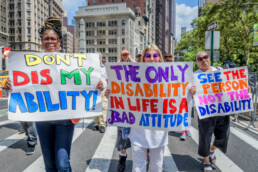The Abortion Provider Treating Texans in Kansas
 April 2, 2024 Evening, Meteor readers, Last night was an incredible spectacle of athleticism and sportsmanship. Of course I’m talking about the most anticipated rematch of the year: LSU vs. Iowa. Both teams fought to the bitter end, but unfortunately for LSU (and baller-turned-meme Hailey Van Lith), Caitlin Clark’s three-pointers could not be stopped.  NOTE HAILEY IN THE BACKGROUND, MARVELING AT ANGEL REESE LIKE THE REST OF US. (VIA GETTY IMAGES) In today’s newsletter, reporter Susan Rinkunas talks to abortion provider Dr. Ghazaleh Moayedi. Plus, a look at the new abortion ban coming out of Florida and a little good news for Olympics fans. From my busted bracket, Shannon Melero  ACROSS STATE LINES“I’m Here As Long As I Can Be”Texas abortion provider Ghazaleh Moayedi, D.O., provides care for her neighbors—but she has to leave the state to do itBY SUSAN RINKUNAS  A TRAVELING HERO (IMAGE COURTESY OF DR. MAOYEDI) After Ghazaleh Moayedi graduated college, she got a job working on the administrative side of Whole Woman’s Health, an abortion clinic in Austin, Texas. She respected the providers who chose the work—many of whom had witnessed illegal abortions before Roe v. Wade—but also thought the patients deserved doctors who looked like them. “I didn't have the language for it at the time,” she says “But I noticed these doctors, older white men, didn't reflect the people that we were taking care of. I knew that we needed new doctors.” So, she went to med school and became an OB/GYN and complex family planning specialist in Dallas in 2018. Less than two years later, Texas lawmakers enacted abortion bans, first during the height of the pandemic, and then via the 2021 bounty hunter law known as Senate Bill 8. A few months later, Roe fell, and now Moayedi travels to Kansas to provide abortions—often to other Texans. I talked to her about what she’s doing to care for people after they return home, and her message for people living in Democratic-led states who think they’re safe from abortion bans. Susan Rinkunas: When did you start traveling to provide abortion care? Ghazaleh Moayedi: I started traveling to Oklahoma in 2020 [after] Gov. Greg Abbott shut down abortion care in our state under the guise of COVID restrictions. Abortion doctors traveling is common—but never from a state like Texas to somewhere else. That is the novel piece over the last few years. It's always a doctor who lives on one of the coasts traveling to a restrictive state. That was a moment where I was like, ‘Oh, crap. In order to take care of Texans, I'm gonna have to start traveling.’ I started working at a couple of clinics there, in addition to the clinics I was working at in Dallas, and did that until Oklahoma shut down—it was about a month or so before Dobbs. Now, I am traveling to Kansas and working in a clinic there. You’ve said it’s surreal to be a Texan leaving the state to care for other Texans leaving the state. Are you commiserating with patients? Do they know you're from Texas? I usually ask people when I make small talk when I'm doing an ultrasound. Like, “Where are you coming in from?” And people usually say Texas, then I ask where. “Oh, where in Dallas? I'm from Dallas, too, that's why I'm asking.” I can just see people's faces change. When I say, “Did you eat at that place? That place is really good,” I can see the light coming from people. It's a moment for us both. We're like, “Yeah, this is bullshit. It's totally bullshit that we're both here.” I had a patient who was like, “I wish you could have just done my abortion in the closet at this restaurant that we both knew.” During a fall trip to Kansas, two of my patients were on the same flight I took. I've still been really processing that in and of itself, that we're all on this flight together, how just stupid, pointless, [and] inhumane this is.  WHAT'S GOING ONSunshine state of mind: Oh, Florida, you never miss an opportunity for mess. Yesterday, the state’s Supreme Court upheld a six-week abortion ban, which will go into effect on May 1. Abortion seekers in the South who have used Florida as a sort of abortion haven over the last two years will now be thrown into a greater state of chaos and desperation than ever before. Last year, 84,052 abortions were performed in Florida—about 7,000 of which were for out-of-state patients. The sliver of good news: The Supreme Court also ruled in favor of allowing Floridians to vote on Amendment 4 in November; that amendment would protect abortion rights through the state’s constitution, voiding the six-week ban entirely. And although Florida will always find a way to Florida, abortion does have a stellar track record when it comes to the ballot box. (Cue DJ Khaled’s “All I Do is Win.”) If you’re reading this from your Golden Girls-esque lanai in Florida, learn more about Amendment 4 here. AND:
 ONE OF THE TARGETED VEHICLES FROM WORLD CENTRAL KITCHEN. (VIA GETTY IMAGES)
FOLLOW THE METEOR Thank you for reading The Meteor! Got this from a friend? Subscribe using their share code or sign up for your own copy, sent Tuesdays and Thursdays.
|
![]()
"I'm Here As Long As I Can Be"
April 2, 2024NEWS,FEATURED STORY
"I'M HERE AS LONG AS I CAN BE"
Texas abortion provider Ghazaleh Moayedi, D.O., provides care for her neighbors—but she has to leave the state to do it
By Susan Rinkunas
After Ghazaleh Moayedi graduated college, she got a job working on the administrative side of Whole Woman’s Health, an abortion clinic in Austin, Texas. She respected the providers who chose the work—many of whom had witnessed illegal abortions before Roe v. Wade—but also thought the patients deserved doctors who looked like them. “I didn’t have the language for it at the time,” she says “But I noticed these doctors, older white men, didn’t reflect the people that we were taking care of. I knew that we needed new doctors.”
So, she went to med school and became an OB/GYN and complex family planning specialist in Dallas in 2018. Less than two years later, Texas lawmakers enacted abortion bans, first during the height of the pandemic, and then via the 2021 bounty hunter law known as Senate Bill 8. A few months later, Roe fell, and now Moayedi travels to Kansas to provide abortions—often to other Texans. I talked to her about what she’s doing to care for people after they return home, and her message for people living in Democratic-led states who think they’re safe from abortion bans.
Susan Rinkunas: When did you start traveling to provide abortion care?
Ghazaleh Moayedi: I started traveling to Oklahoma in 2020 [after] Gov. Greg Abbott shut down abortion care in our state under the guise of COVID restrictions. Abortion doctors traveling is common—but never from a state like Texas to somewhere else. That is the novel piece over the last few years. It’s always a doctor who lives on one of the coasts traveling to a restrictive state. That was a moment where I was like, ‘Oh, crap. In order to take care of Texans, I’m gonna have to start traveling.’ I started working at a couple of clinics there, in addition to the clinics I was working at in Dallas, and did that until Oklahoma shut down—it was about a month or so before Dobbs. Now, I am traveling to Kansas and working in a clinic there.
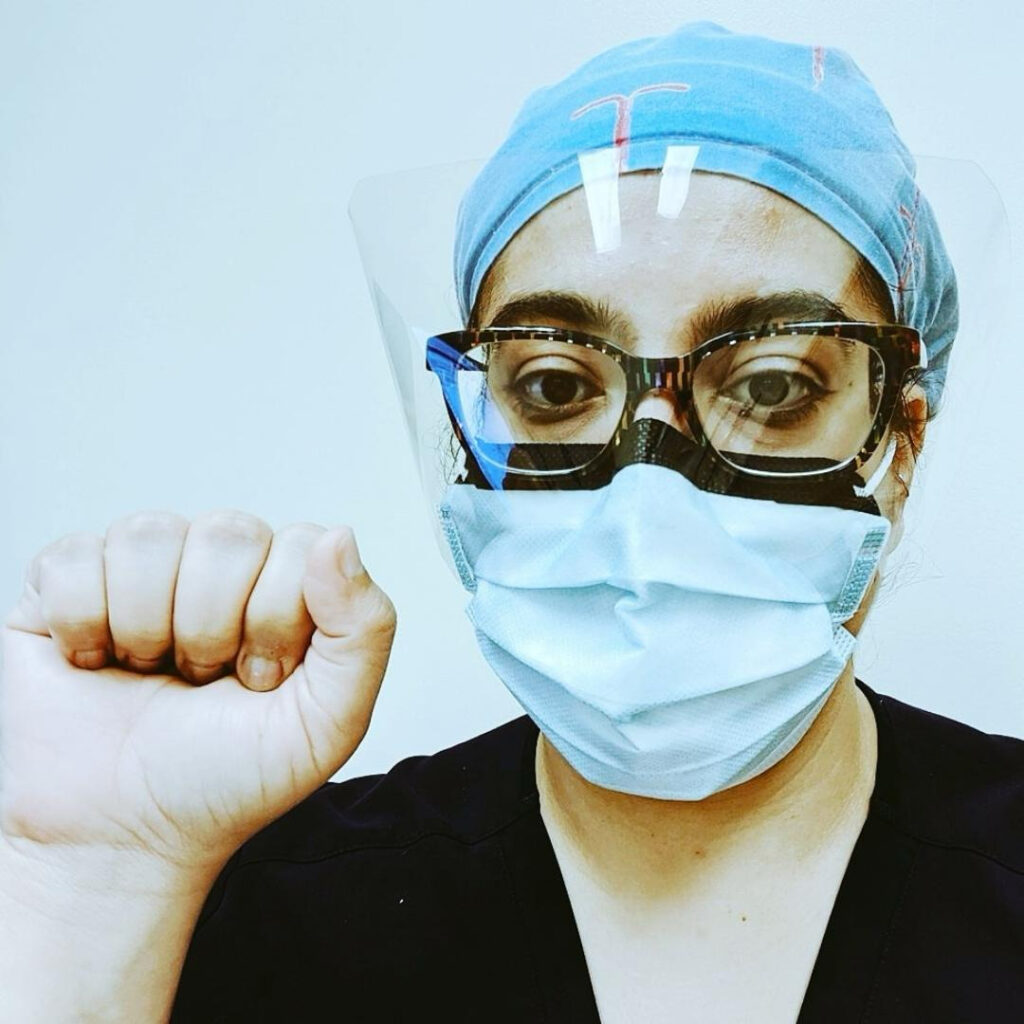
You’ve said it’s surreal to be a Texan leaving the state to care for other Texans leaving the state. Are you commiserating with patients? Do they know you’re from Texas?
I usually ask people when I make small talk when I’m doing an ultrasound. Like, “Where are you coming in from?” And people usually say Texas, then I ask where. “Oh, where in Dallas? I’m from Dallas, too, that’s why I’m asking.” I can just see people’s faces change. When I say, “Did you eat at that place? That place is really good,” I can see the light coming from people. It’s a moment for us both. We’re like, “Yeah, this is bullshit. It’s totally bullshit that we’re both here.” I had a patient who was like, “I wish you could have just done my abortion in the closet at this restaurant that we both knew.”
During a fall trip to Kansas, two of my patients were on the same flight I took. I’ve still been really processing that in and of itself, that we’re all on this flight together, how just stupid, pointless, [and] inhumane this is.
Are there certain patients you can’t stop thinking about?
I’ve had patients whose partners have lost their jobs because of the time they have to take to come and travel. There’s a ripple effect of harm that happens from people needing to travel to get abortions.
When someone does a medication abortion [as Dr. Moayedi sometimes does for Texas patients in Kansas], there are rare cases where it doesn’t work. If I’m seeing them in Texas for an ultrasound afterward but there’s still a continuing pregnancy, it’s like, “Shit, you’ve gotta go out of state again.” I can’t do anything for them, and it’s unconscionable. Before [Dobbs], someone would show up a week after their medication abortion, and I could be like, “Yep, everything looks good” or, “Nope, it didn’t work. Okay, I can do an aspiration right now for you.” Now, it’s a never-ending saga.
In other states [like Kansas], it’s “take your medication abortion, and then in five weeks, take a pregnancy test.” Some of these people are waiting five weeks to be able to fully confirm that their abortion is complete. Not only did they have probably several weeks of waiting to get an appointment, get out of state, then do their pills, then come back—but now they’re going to have to wait another month to know that it’s complete. This is like a two-month minimum cycle in someone’s life of just trying to end this pregnancy.
I’m definitely seeing people making that calculation [about medication abortion] in their mind of, “Wait, then I have to wait to know that it’s done?” They’re so stressed out—they had to do all this travel—that they’re like, “I’m just gonna do a procedure [instead] so I can leave here knowing.” You take good care of them, but states are taking people’s autonomy away, and they’re being forced to make decisions out of this insulting process.
And you’re providing ultrasounds in Texas now?
After a Dallas abortion clinic closed in spring 2023, I started a little ultrasound practice so that, at least for folks in my general area, people don’t have to wait five weeks [to find out if their pills worked]. They can get an ultrasound with a trusted provider who isn’t going to judge them and who has deep experience in abortion care.
People really need a community-based provider that they can turn to when they come back [from an out-of-state abortion], someone that they can trust and talk to. It sucks not being able to provide abortions [in Texas]. But it is this whole new chapter of my work. It feels really good to still be able to take care of people in the ways that I legally can.
I mean, folks are going to crisis pregnancy centers for ultrasounds before and after abortions because they’re free. People are able to schedule appointments with me via Pegasus Health Justice Center. I have a cash rate that’s $250, but I’m working with abortion funds, and pretty much everyone is able to get funded.
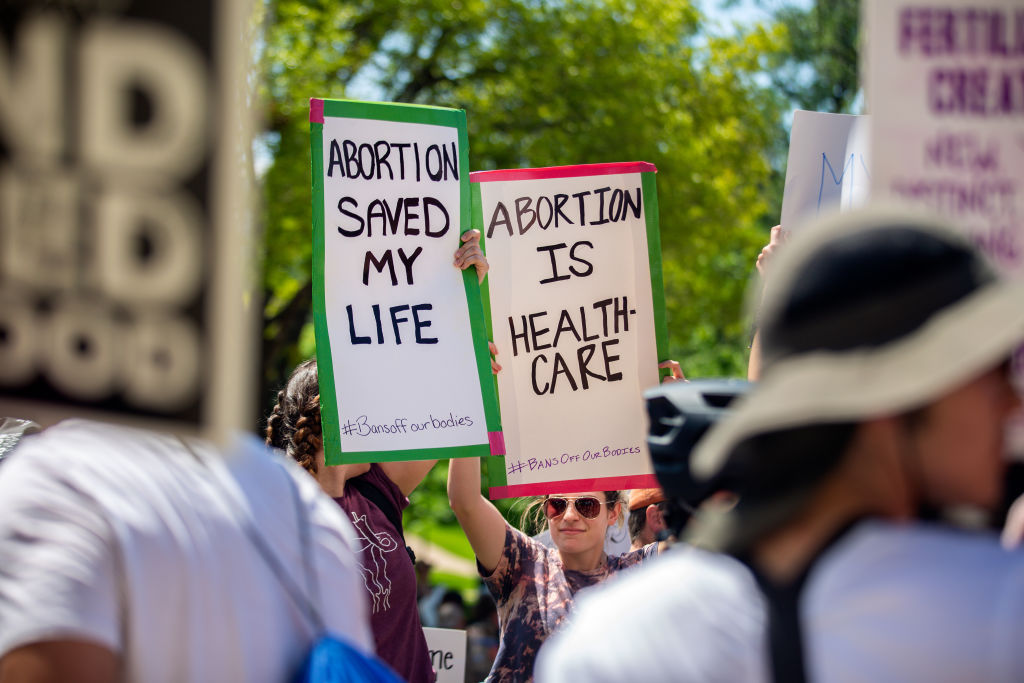
Have you thought about leaving Texas?
There isn’t such a thing as a safe state. We are one country, and these types of tactics are coming to every state. This mentality isn’t concentrated here [in Texas]. It exists in states without abortion restrictions as well. But people have this false belief that they are safe in these bubbles, and even within states like California and New York, the [anti-abortion] mentality exists. This extreme right, fascist, white-power movement exists everywhere, and abortion restrictions are an extension of that—they’re not separate from it.
After the Dobbs decision, I was feeling really low, even though we knew it was coming. It was like, “What the hell am I gonna do?” I considered moving and told my friends. I started looking at Zillow everywhere, like, “What’s New Jersey like? What’s Michigan like?” I interviewed for a few jobs in other states, and that was a couple of months of pouting and wondering what I was going to do. But I’m not going to escape from white supremacy anywhere in this country. I can move somewhere else and have a little bit more leeway in my work, but until when? We might have a president that is literally presidenting from jail.
Right, there could be a national abortion ban in January 2025.
Exactly. The reality is, I could pick up and move my whole family, and we could go somewhere “safe” for a period of time—and then what? I’m here as long as I can be. I think the idea that this is concentrated [in Texas] is really short-sighted. Everyone has a role to play in combating white supremacy and fascism within their own communities.
There’s a ripple effect of harm that happens from people needing to travel to get abortions.
What do you think of the talk online where people urge doctors to defy hospital orders and perform abortions in health emergencies?
It makes me incredibly annoyed and pissed off. That’s not how hospitals work. It’s not like I can just waltz into an operating room and say, “I am ready to do a surgery now.” Even when any hospital I worked at allowed it, there were still often multiple hoops I would have to jump through. Sometimes, even though it met all of the policy guidelines, there was someone who delayed the case because they needed to talk to someone who needed to talk to someone.
Doctors don’t own the hospital. We don’t actually direct anything in the hospital or schedule cases. There are multiple layers of people that have to approve things and even once it is approved, financially and policy-wise, you can still show up on that day and your anesthesiologist refuses, the nurse refuses, the tech refuses. I can’t do it alone in a hospital. I
could go to jail. I could lose my medical license, and then who am I going to help?
And rather than suggesting medical providers flout state laws, there are people organizing community networks for abortion pills, like Red State Access.
What pill networks are doing—that’s envisioning the future and being the future that we want and doing the work that needs to be done at the community level. That is how we change culture. That is how we address people’s needs in the moment, and we live out the future that we want. We’re saying we don’t need the courts to let us live the free lives that we can have. We actually have autonomy over ourselves.
That is, on all these micro levels and within communities, what people need to be doing: envisioning and living within the just future that we all deserve.
How the Media Excludes Trans Voices
 March 28, 2024 Buona sera, Meteor readers, It is the official start of Easter weekend, with today being Holy Thursday for Christians and Thirsty Thursday for everyone else. Either way, wine is encouraged. No matter what the next few days bring you, we hope this weekend is a great one. In today’s newsletter, we take a look at how the media continues to fail trans people. Plus, a little bit of good news and our weekend reading list. Xoxo, Shannon Melero  WHAT'S GOING ONPanic! at the Times Disco: A new report from Media Matters and GLAAD has found that over the last year, The New York Times “excluded the perspectives of trans people”—referencing a failure to quote them—“from two-thirds of its stories about anti-trans legislation.” The study comes more than a year after Times leadership received two separate letters from staff members and LGBTQ advocates and organizations charging the paper with contributing to “a deadly anti-LGBTQ culture war.” According to the report, 66% of the articles covering the aggressive anti-LGBTQ legislation sweeping the nation did not quote a single trans or gender non-conforming person, but 18% of those same articles did cite misinformation from anti-trans activists “without adequate fact-checking or additional context.” Media Matters cited as an example this piece on North Dakota banning trans girls from girls’ sports teams, which didn’t ask any of the banned players how they’d been affected. The issue, of course, isn’t just about the Times’s journalism; it’s about the too-common framing of trans people as politically controversial entities rather than as members of communities everywhere. And those community members are under attack like never before: Last year, according to the ACLU, 510 anti-LGBTQ bills were introduced by legislators in nearly every state. (The only states which did not see bills introduced were New York, Delaware, and Illinois.) Of those bills, 84 were signed into law, doing everything from restricting bathroom use to eliminating gender-affirming care. Against that backdrop, reporting on anti-trans laws while omitting the people and families who know first-hand what they do is a dangerous act of dehumanization. You can read the full report here. AND:
 AID PACKAGES FALLING FROM THE SKY IN SOUTHERN GAZA. (IMAGE VIA GETTY)
 CLICK THE LINK ABOVE TO GET YOUR UNIQUE SHARE CODE TO SEND TO A FEW FRIENDS. IF FIVE OF THEM SIGN UP FOR THIS NEWSLETTER, YOU GET A METEOR TOTE!  WEEKEND READING 📚On the road: In an effort to woo environmentally conscious voters, both Republicans and Democrats are talking more about electric cars. But climate journalist Emily Atkin says we’re in for a wild ride of EV misinformation. (Heated) On education: Who the heck is Baby Olivia, and why is she in our classrooms? (The 19th) On “self-creation”: Photographer Rahim Fortune has beautifully executed the daunting task of capturing the lives, landscape, and character of the rural south. (The Atlantic)  FOLLOW THE METEOR Thank you for reading The Meteor! Got this from a friend? Subscribe using their share code or sign up for your own copy, sent Tuesdays and Thursdays.
|
![]()
What the SCOTUS Hearing Could Mean for Mifepristone
 March 26, 2024 Evening, Meteor readers, It was a brilliant weekend for basketball but not so brilliant for my bracket. Congratulations to this week’s top three participants in the Meteor’s March Madness bracket challenge: Marsha, Em, and my husband. In today’s newsletter, Samhita Mukhopadhyay speaks to Dr. Beverly Winikoff and Dr. Lisa Haddad of the Population Council, a research nonprofit with a special relationship to the Supreme Court’s mifepristone case—oral arguments for which were heard today. Plus we congratulate a history-making Englishwoman and check in on Diddy. Crossing my fingers for The Sweet 16, Shannon Melero  WHAT'S GOING ON
 TODAY AT SCOTUSThe Abortion Pill on TrialOne of its key researchers says Mifepristone was tested "with three times or more rigor" than other drugs.BY SAMHITA MUKHOPADHYAY ACTIVISTS OUTSIDE OF THE SUPREME COURT LAST SPRING IN SUPPORT OF THE ABORTION PILL. (VIA GETTY IMAGES) Today, the Supreme Court heard oral arguments in the first abortion case to come before the court since it overturned Roe v. Wade. The case, brought by the extremist group Alliance for Hippocratic Medicine (AHM), is challenging the U.S. Food and Drug Administration (FDA)—specifically the FDA’s 2016-2021 policies, which expanded access to the safe and effective abortion drug mifepristone, initially approved in 2000 and now the most common abortion method across the country. AHM’s main argument? That the FDA did not adequately study mifepristone’s safety risks. (We explain it more in-depth here.) The implications of this decision could be disastrous. As Fatima Goss Graves, President and CEO at the National Women’s Law Center, told us, “Banning mifepristone would upend abortion care not just in the conservative states that have been racing to ban it—but in all 50 states, no matter their laws.” But the case itself is farfetched, argues Dr. Lisa Haddad, the medical director for the Population Council’s Center for Biomedical Research, the nonprofit research center that led clinical testing on mifepristone more than two decades ago. In fact, she points out, over 5 million people have successfully used it since then. With the case now before the court, we spoke to Dr. Haddad and Dr. Beverly Winikoff, who worked at the Population Council for 25 years, where she was Program Director for Reproductive Health and Senior Medical Associate at the Council, which was the team that led clinical trials on mifepristone overseas. Now she serves as president of Gynuity Health Projects. Samhita Mukhopadhyay: You worked with the organization that facilitated the FDA approval of mifepristone—what are you feeling right now? Dr. Beverly Winikoff: I feel like I'm charging into the skirmish. I'm getting girded up. Can't these people ever go away? But it is very, very encouraging to see how everyday people understand that this is a highly political, not a scientific discussion. Dr. Lisa Haddad: I feel very frustrated and a little bit beaten up. And while I’m inspired by some of the voices speaking up in support of mifepristone, I see this trend in reducing access for women, and I'm scared that the science and the excellent evidence that supports this as a way to improve health outcomes will be overlooked and minimized. It's a slippery slope. BW: I think in the end, it'll be okay because of the politics—the FDA is there to do a job, and it has always done it quite well in protecting the public. And this is an attack on the FDA. When you look at it that way, there are many people who are on our side, including big pharma—because if this happens, they have no [incentive] to be able to put money into new drugs because somebody could come up and decide that they don't like that drug and they can [sue to] override the FDA, and that would be chaotic in the pharmaceutical world. It's not just abortion; it's every drug that gets approved. I think the politics of it is much bigger than abortion. That’s a good point. Can you walk us through what we need to know about the FDA approval of mifepristone? Was it the standard approval process or was it a long, hard-fought win? BW: It was cover-your-ass time the whole way along by the FDA. That was it. That was the theme. So, every single thing was done with three times or more rigor than any other drug I've ever heard of. But that's okay because the drug is very good and very safe. We also got the FDA staff to be very excited about it. People were really very interested in making sure it got through. When we did the final studies, we had several thousand people, and it performed very, very well. We were very attached to this product because it seemed safer and more effective than you could expect. So people were very excited about it because it had the potential to be a workaround for some of the political stuff of having to go to a clinic. You were doing it at home.  FOLLOW THE METEOR Thank you for reading The Meteor! Got this from a friend? Subscribe using their share code or sign up for your own copy, sent Tuesdays and Thursdays.
|
![]()
The Abortion Pill on Trial
March 26, 2024NEWS,FEATURED STORY
A home for modern feminism
One of its key researchers says Mifepristone was tested “with three times or more rigor” than other drugs.
BY SAMHITA MUKHOPADHYAY
Today, the Supreme Court heard oral arguments in the first abortion case to come before the court since it overturned Roe v. Wade. The case, brought by the extremist group Alliance for Hippocratic Medicine (AHM), is challenging the U.S. Food and Drug Administration (FDA)—specifically the FDA’s 2016-2021 policies, which expanded access to the safe and effective abortion drug mifepristone, initially approved in 2000 and now the most common abortion method across the country. AHM’s main argument? That the FDA did not adequately study mifepristone’s safety risks. (We explain it more in-depth here.)
The implications of this decision could be disastrous. As Fatima Goss Graves, President and CEO at the National Women’s Law Center, told us, “Banning mifepristone would upend abortion care not just in the conservative states that have been racing to ban it—but in all 50 states, no matter their laws.”
But the case itself is farfetched, argues Dr. Lisa Haddad, the medical director for the Population Council’s Center for Biomedical Research, the nonprofit research center that led clinical testing on mifepristone more than two decades ago. In fact, she points out, over 5 million people have successfully used it since then.
With the case now before the court, we spoke to Dr. Haddad and Dr. Beverly Winikoff, who worked at the Population Council for 25 years, where she was Program Director for Reproductive Health and Senior Medical Associate at the Council, which was the team that led clinical trials on mifepristone overseas. Now she serves as president of Gynuity Health Projects.
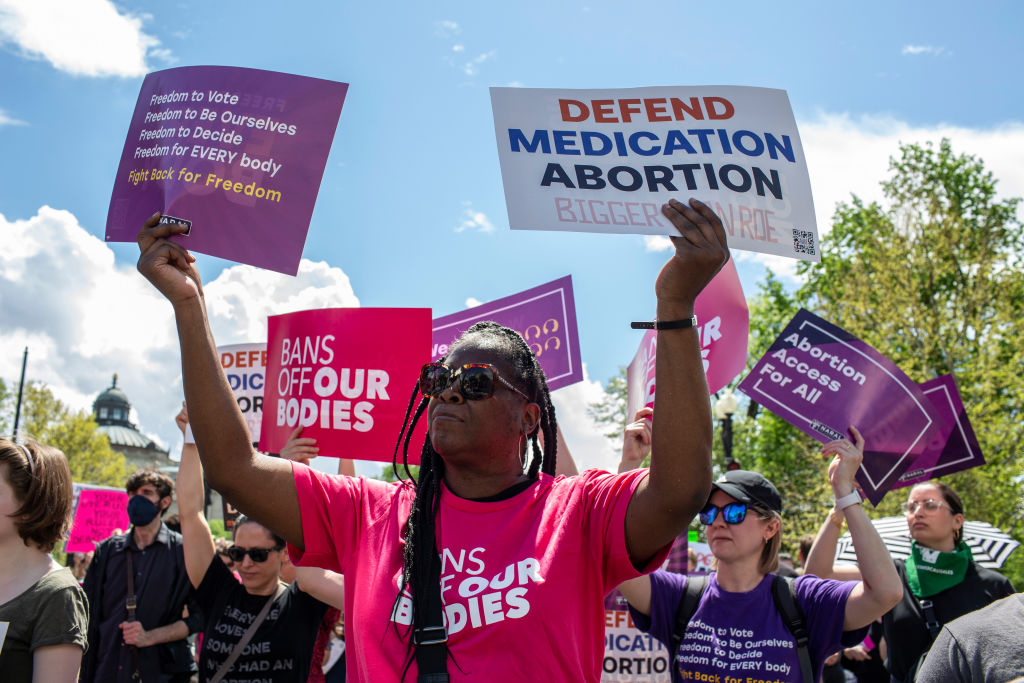
Samhita Mukhopadhyay: You worked with the organization that facilitated the FDA approval of mifepristone—what are you feeling right now?
Dr. Beverly Winikoff: I feel like I’m charging into the skirmish. I’m getting girded up. Can’t these people ever go away? But it is very, very encouraging to see how everyday people understand that this is a highly political, not a scientific discussion.
Dr. Lisa Haddad: I feel very frustrated and a little bit beaten up. And while I’m inspired by some of the voices speaking up in support of mifepristone, I see this trend in reducing access for women, and I’m scared that the science and the excellent evidence that supports this as a way to improve health outcomes will be overlooked and minimized. It’s a slippery slope.
BW: I think in the end, it’ll be okay because of the politics—the FDA is there to do a job, and it has always done it quite well in protecting the public. And this is an attack on the FDA. When you look at it that way, there are many people who are on our side, including big pharma—because if this happens, they have no [incentive] to be able to put money into new drugs because somebody could come up and decide that they don’t like that drug and they can [sue to] override the FDA, and that would be chaotic in the pharmaceutical world. It’s not just abortion; it’s every drug that gets approved. I think the politics of it is much bigger than abortion.
That’s a good point. Can you walk us through what we need to know about the FDA approval of mifepristone? Was it the standard approval process or was it a long, hard-fought win?
BW: It was cover-your-ass time the whole way along by the FDA. That was it. That was the theme. So, every single thing was done with three times or more rigor than any other drug I’ve ever heard of. But that’s okay because the drug is very good and very safe. We also got the FDA staff to be very excited about it. People were really very interested in making sure it got through.
When we did the final studies, we had several thousand people, and it performed very, very well. We were very attached to this product because it seemed safer and more effective than you could expect. So people were very excited about it because it had the potential to be a workaround for some of the political stuff of having to go to a clinic. You were doing it at home.
Dr. Haddad, can you speak to the significance of Tuesday’s case? Depending on the decision, what could the implication be?
LH: An increasing number of individuals are getting access to abortion only through medication abortion. I’m in Georgia, where we have a 6-week abortion ban. Finding out that you’re pregnant, making an appointment, getting off of work, getting a way to get there, and all of that before six weeks is hard. But if people make it to the clinic, medication abortion at that very, very early gestational age is a potentially good option for individuals, and the addition of mifepristone [generally used with misoprostol] enhances the likelihood of success. Also, without mifepristone, the barriers to access are huge. It’ll make it even harder for more individuals to obtain care.
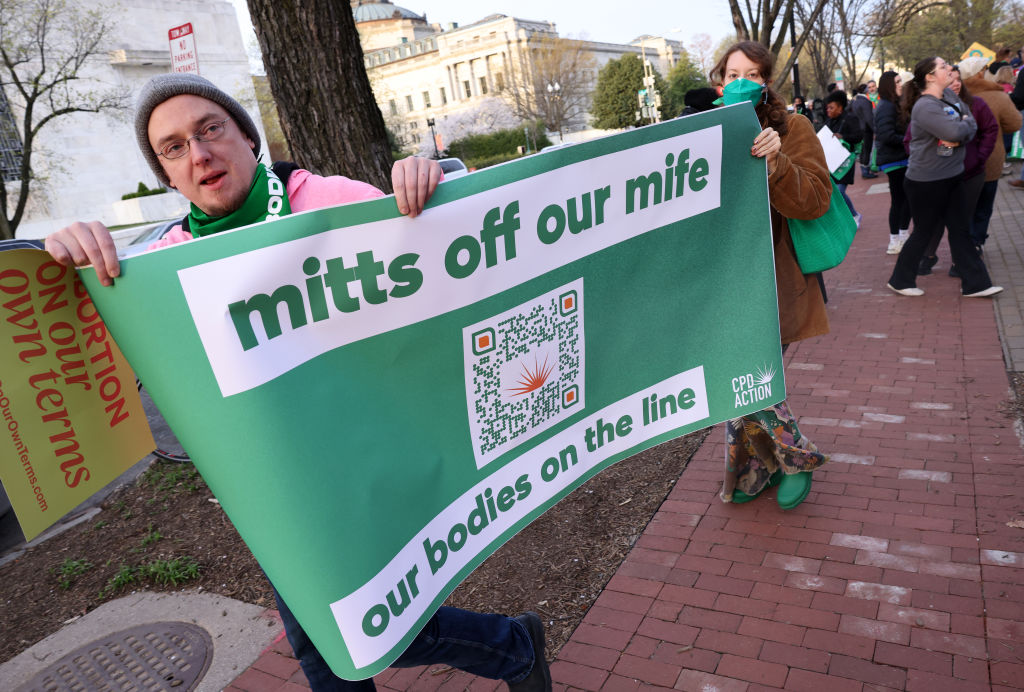
And what could this case mean for misoprostol?
BW: Well, one of the things that mifepristone does is soften the cervix. So that means that whatever’s coming out doesn’t have as hard a time. And there are a lot of pain fibers in the cervix, so it could be more painful to just use misoprostol. But you can do it for most people. It will work, but it’s not maybe as pleasant.
LH: An abortion with mifepristone is gentler on the body, it gives the person a little bit more control, and it’s more predictable in terms of how it’s going to go.
BW: What saves the day for some of these other drugs is that they have other uses. So methotrexate is also abortifacient, but nobody’s trying to take that off the market. Nor misoprostol, actually. [Methotrexate is used for cancer while misoprostol can be used to treat ulcers and to induce labor] And so I think one of the things is maybe to get drugs that have dual purposes.
LH: And there are opportunities for that. Mifepristone does have utility for other indications. There’s excellent evidence that it’s great for fibroids and that it can be used for contraception. There is evidence, and it’s used commonly as emergency contraception in many countries. It’s just not approved in the U.S., and so I wonder whether or not that would enhance its security.
BW: Yeah, somebody should put it in for approval.
LH: We’re actually trying to garner support to do that right now, Beverly. But again, the evidence in the [case] is ridiculous when you break it down. It’s challenging the ability of scientists to make a decision, but not on all issues, just an issue that bothers [the plaintiffs] morally. But it’s not based on science. It’s frustrating to see because just the fact that we’ve gotten this far—I mean, it shouldn’t have a foot to stand on, and yet it is at the Supreme Court.
BW: I think it’s a terrible thing for individuals—not just people wanting abortion, people who want to use drugs for anything.
LH: And even, I mean right now, the standard of care shows that the mifepristone regimen works better for miscarriage management. This focus on something that really shouldn’t even be questioned just highlights the [message] that women are not trusted, women need to suffer, and that doctors and scientists can’t be trusted. Also, on top of what Beverly said, I just want to highlight that it’s not just the FDA that says [mifepristone] is safe. All of the different medical agencies like ACOG and the Society of Maternal-Fetal Medicine, say that mifepristone is incredibly safe with very few adverse events. We know the risks are incredibly low, less than 0.3% of any sort of serious, major adverse events. The risk of death is almost non-existent, whereas if you compare that to forcing somebody to continue with a pregnancy, we know that those risks are.
Over 5 million people have used mifepristone for either medication abortion or miscarriage management. This is not something that is not well evaluated.
As of right now, medication abortion is still available. Learn more here.
How can sterilization without consent be legal?
|
No images? Click here Yeehaw, Meteor readers, I assume we have all seen Beyoncé’s cover art for her next album, “Cowboy Carter,” which drops on March 29. As a country music lover myself, I can’t wait. In the meantime, may I entertain you with a song from Tanner Adell, another country artist whose music really spins my spurs? In today’s newsletter, we introduce you to disability rights activist and Ford Foundation officer Rebecca Cokley, who is shedding light on the forced sterilization of disabled people—a practice that’s still legal in many states. Plus, the death of a gaming icon, Joe Biden cancels more student loan debt (not mine 😞), and a weekend reading list. Your wannabe buckle bunny, Shannon Melero  WHAT'S GOING ON
 "AN UNEQUIVOCAL RIGHT TO BODILY AUTONOMY"Reproductive Justice for All of UsRebecca Cokley on how to stop the violence disabled people experienceBY SHANNON MELERO PARADE GOERS AT NEW YORK’S FIFTH ANNUAL DISABILITY PRIDE PARADE. (PHOTO BY ERIC MCGREGOR VIA GETTY IMAGES) “It is better for all the world if…society can prevent those who are manifestly unfit from continuing their kind.” That sentence, written by Justice Oliver Wendell Holmes in 1927, was the defining sentiment behind the seminal Supreme Court decision Buck v. Bell—a case which allowed states to continue the practice of forcibly sterilizing those it deemed unfit to reproduce, namely people of color, the physically disabled, and those considered to have mental “deficiencies.” In the specific situation behind Buck v. Bell, the plaintiff was Carrie Buck, a young white woman in Virginia who was forcibly sterilized for her “feeble-mindedness” under that state’s Eugenical Sterilization Act. It would be easy to dismiss that ruling and Holmes’ words as a relic from another time if the practice of forced sterilization hadn’t lingered so long after that case. Over the course of the twentieth century, roughly 70,000 Americans (mostly women of color) were forcibly sterilized—a practice activist Fannie Lou Hamer famously labeled the “Mississippi appendectomy.” And while the work of activists like Dr. Helen Rodriguez-Trias, founder of the Committee to End Sterilization Abuse, brought some change in the 1970s, forced sterilization is still a painful reality: As of 2022, there are 31 states where the practice can be authorized by a judge and/or performed on a disabled person without their consent. Rebecca Cokley—the preeminent activist and program officer of disability rights at the Ford Foundation—encountered this situation firsthand while giving birth to her daughter in 2013, and she shared the story onstage at Free Future 2023. As she was undergoing a C-section, Cokley recalled, her anesthesiologist said to her OBGYN, “While you’re down there, why don’t you go ahead and tie her tubes? Because kids like her don’t need to have kids.” Cokley’s OBGYN refused and, as Cokley put it, almost “jumped over the drape to beat him to a pulp.” But for many disabled people in America, that kind of support is non-existent. Instead, they’re left at the mercy of a medical system that, by design, excludes them. A 2023 study published in The Lancet found that “32% of health care professionals hold explicit preferences for non-disabled people over disabled people.” And as Cokley explains, the practice of forced sterilization is part of a larger pattern of disabled people—”especially women and girls”—being denied bodily autonomy: "You’re never told your body is yours and you have the right to say no,” she points out. “You’re never given ownership over your body.” Other advances have helped safeguard the rights of disabled people in certain areas—from the educational reforms of Thomas H. Gallaudet in 1817 to the passage of the Americans with Disabilities Act in 1990. Cokley and others want to ensure that reproductive justice, and the rights of all people with disabilities to have children how and when they want, is on the table, too. “We have an unequivocal right to bodily autonomy, and to make these choices,” she says. Cokley also notes, “Every policy recommendation moving forward on reproductive health, rights, justice, must include a disability lens. So when hearing about people having to travel across multiple states to access [abortion] care, I want the public to think. ‘So what would that mean if you're disabled and say, don't have access to accessible transportation, or need other assistance?’" You can watch Cokley onstage at Free Future 2023, in conversation with Catalina Devandas, the UN’s first Special Rapporteur on the Rights of Persons with Disabilities and human rights advocate Maryangel Garcia-Ramos, here. (Their session begins at 2:25:25.) This series is a collaboration between the Gender, Ethic, and Racial Justice - International program at the Ford Foundation and The Meteor.  WEEKEND READING 📚On the ground: Over a thousand Gazan children have survived unfathomable violence and been medically evacuated to surrounding countries where they live as refugees and amputees. One reporter asks: What will the rest of their lives look like? (The New Yorker) On rising stars: USC’s Juju Watkins is ready to steal the spotlight during this year’s NCAA Tournament. As the kids say, she’s got the rizz. (The Washington Post) On family trees: The unexpected way some people are discovering the prevalence of incest. (The Atlantic)  FOLLOW THE METEOR Thank you for reading The Meteor! Got this from a friend? Subscribe using their unique share code or snag your own copy, sent Tuesdays and Thursdays.
|
![]()
Reproductive justice for all of us
REPRODUCTIVE JUSTICE FOR ALL OF US
Rebecca Cokley on how to stop the violence disabled people experience
By Shannon Melero
“It is better for all the world if…society can prevent those who are manifestly unfit from continuing their kind.”
That sentence, written by Justice Oliver Wendell Holmes in 1927, was the defining sentiment behind the seminal Supreme Court decision Buck v. Bell—a case that allowed states to continue the practice of forcibly sterilizing those it deemed unfit to reproduce, namely people of color, the physically disabled, and those considered to have mental “deficiencies.” In the specific situation behind Buck v. Bell, the plaintiff was Carrie Buck, a young white woman in Virginia who was forcibly sterilized for her “feeble-mindedness” under that state’s Eugenical Sterilization Act.
It would be easy to dismiss that ruling and Holmes’ words as a relic from another time if the practice of forced sterilization hadn’t lingered so long after that case. Over the course of the twentieth century, roughly 70,000 Americans (mostly women of color) were forcibly sterilized—a practice activist Fannie Lou Hamer famously labeled the “Mississippi appendectomy.” And while the work of activists like Dr. Helen Rodriguez-Trias, founder of the Committee to End Sterilization Abuse, brought some change in the 1970s, forced sterilization is still a painful reality: As of 2022, there are 31 states where the practice can be authorized by a judge and/or performed on a disabled person without their consent.
Rebecca Cokley—the preeminent activist and program officer of disability rights at the Ford Foundation—encountered this situation firsthand while giving birth to her daughter in 2013, and she shared the story onstage at Free Future 2023. As she was undergoing a C-section, Cokley recalled, her anesthesiologist said to her OBGYN, “While you’re down there, why don’t you go ahead and tie her tubes? Because kids like her don’t need to have kids.” Cokley’s OBGYN refused and, as Cokley put it, almost “jumped over the drape to beat him to a pulp.”
But for many disabled people in America, that kind of support is non-existent. Instead, they’re left at the mercy of a medical system that, by design, excludes them. A 2023 study published in The Lancet found that “32% of health care professionals hold explicit preferences for non-disabled people over disabled people.” And as Cokley explains, the practice of forced sterilization is part of a larger pattern of disabled people—”especially women and girls”—being denied bodily autonomy: “You’re never told your body is yours and you have the right to say no,” she points out. “You’re never given ownership over your body.”
Other advances have helped safeguard the rights of disabled people in certain areas—from the educational reforms of Thomas H. Gallaudet in 1817 to the passage of the Americans with Disabilities Act in 1990. Cokley and others want to ensure that reproductive justice, and the rights of all people with disabilities to have children how and when they want, is on the table, too. “We have an unequivocal right to bodily autonomy, and to make these choices,” she says.
Cokley also notes, “Every policy recommendation moving forward on reproductive health, rights, justice, must include a disability lens. So when hearing about people having to travel across multiple states to access [abortion] care, I want the public to think. ‘So what would that mean if you’re disabled and say, don’t have access to accessible transportation, or need other assistance?’”
You can watch Cokley onstage at Free Future 2023, in conversation with Catalina Devandas, the UN’s first Special Rapporteur on the Rights of Persons with Disabilities and human rights advocate Maryangel Garcia-Ramos, here. (Their session begins at 2:25:25.)
Facing 10 Years of Prison for Smoking Weed
 March 19, 2024 Greetings, Meteor readers, It’s last call for any of you wanting to participate in our March Madness challenge! Just click the button below to join our group and share your women’s bracket. And don’t forget, the best way to support women’s sports is to watch: Most games will be available on ESPN2 or ESPNU, but UConn v. Jackson State and Iowa v. Holy Cross—featuring Paige Bueckers and Caitlin Clark, of course—will be on ABC. In today’s newsletter, I promise not to speak further of basketball. Instead, Samhita Mukhopadhyay walks us through Oprah’s weight loss special. Plus, a new book for your TBR pile and a princess sighting. Ball is life, Shannon Melero  WHAT'S GOING ONOprah is done with the fat shaming…again: ICYMI, Oprah has another special out about weight shame and drugs like Ozempic. Released yesterday on the heels of her decision to step down from the Weight Watchers board and share with the public that she herself is on a semaglutide (the much talked about class of drugs like Ozempic and Mounjaro), the show was an effort at busting common myths around obesity. As someone who’s written about the topic, I thought I’d break down the good and less-good coverage: The good: She emphasized one of the most groundbreaking shifts in thinking that has come thanks to the popularity of these new “obesity meds”—the understanding that weight gain is not solely connected to your willpower. People often discriminate against and hate fat bodies because they believe fat people lack the personal control not to be fat, and, for this reason, deserve the shame and admonishment we as a society dole out to them. In developing drugs that address physiological components, science is confirming what fat activists have long said: Some of our bodies are just different, and the only path forward is to accept that. But here’s where the special missed the mark: Rather than rethink what our hatred of fat bodies means for society and medical institutions—something that would be groundbreaking for Oprah to do—she purports that one of the only ways to eradicate this stigma is to become unfat, most notably through the help of this new class of drugs. (The special features several weight loss “success” stories of people whose lives changed dramatically by taking a semaglutide). But why is being fat something that needs to be solved? It’s great that Oprah is undoing the shame we feel around our decision to take these drugs—but perhaps it’s also okay to just be fat. (FWIW, I believe Oprah knows this truth; it’s just not an easy one to get across in primetime.) The only people who should really feel shame are those who continue to perpetuate the idea that the only way to live a healthy, happy life is to be thin. For more on how Oprah has contributed to how we talk and think about weight loss, check out this episode of In Retrospect about her lifelong, public battle with her weight and what it’s meant for the culture. At the top of her special, Oprah admits she gave in to the pressure to apologize for her weight and refuses to do so anymore. I’m happy for her. But what would it look like to embrace such an attitude without also recentering thinness? AND:
 ONE WOMAN'S FIGHT“This Isn't Speedy or Fair”Lauren Smith’s waited over four years for her day in court.BY NEDA TOLOUI-SEMNANI  LAUREN SMITH HAS BEEN SEPARATED FROM HER YOUNGEST CHILD FOR FIVE YEARS. (IMAGE VIA THE METEOR) Four months ago, I wrote in this space about Lauren Smith, a 32-year-old mother who lost custody of her youngest child in 2019 after she and her infant tested positive for THC, a cannabinoid substance, at delivery. Smith was arrested six months later and charged with felony child neglect for using marijuana while pregnant—a charge which, in Greenville, South Carolina, carries a sentence of up to 10 years in prison. When we published the article, Smith’s trial date was set for the week of February 19, 2024, which was, rather poetically, five years nearly to the day after she had delivered and lost custody of her youngest daughter. The child has been living with her paternal grandmother since she was three days old. But weeks before the trial was set to start, Smith learned her court date would be pushed for a third time. It is now scheduled for the week of April 22. “Isn't everybody due a speedy, fair trial?” Smith told me earlier this month. “This isn't speedy or fair.” The latest holdup comes after the Greenville County solicitor's office entered more than 125 pages of new documentation into discovery. This is called a “document dump,” a legal maneuver in which one side enters hundreds, sometimes thousands, of pages of new documentation within weeks of trial in an effort to overwhelm the opposing side. (This is the second time the prosecution has used this delay tactic. The first was last May when they entered several hundred additional pages of documentation as discovery.) Despite the U.S. Constitution guaranteeing the right to a fast trial, Stuart Sarratt, a former Greenville County public defender familiar with the Smith case, says, “South Carolina essentially does not have any kind of right to speedy trial.”  PHOTO BY NILO TABRIZI Neda Toloui-Semnani is an Emmy-winning journalist and the author of They Said They Wanted Revolution: A Memoir of My Parents.  FOLLOW THE METEOR Thank you for reading The Meteor! Got this from a friend? Sign up for your own copy, sent Tuesdays and Thursdays.
|
![]()
"This Isn't Speedy or Fair"
March 19, 2024NEWS,FEATURED STORY
A home for modern feminism
Lauren Smith’s Waited Over Four Years for Her Day in Court
By Neda Toloui-Semnani
Four months ago, I wrote in this space about Lauren Smith, a 32-year-old mother who lost custody of her youngest child in 2019 after she and her infant tested positive for THC, a cannabinoid substance, at delivery. Smith was arrested six months later and charged with felony child neglect for using marijuana while pregnant—a charge which, in Greenville, South Carolina, carries a sentence of up to 10 years in prison.
When we published the article, Smith’s trial date was set for the week of February 19, 2024, which was, rather poetically, five years nearly to the day after she had delivered and lost custody of her youngest daughter. The child has been living with her paternal grandmother since she was three days old.
But weeks before the trial was set to start, Smith learned her court date would be pushed for a third time. It is now scheduled for the week of April 22.
“Isn’t everybody due a speedy, fair trial?” Smith told me earlier this month. “This isn’t speedy or fair.”
The latest holdup comes after the Greenville County solicitor’s office entered more than 125 pages of new documentation into discovery. This is called a “document dump,” a legal maneuver in which one side enters hundreds, sometimes thousands, of pages of new documentation within weeks of trial in an effort to overwhelm the opposing side. (This is the second time the prosecution has used this delay tactic. The first was last May when they entered several hundred additional pages of documentation as discovery.)
Despite the U.S. Constitution guaranteeing the right to a fast trial, Stuart Sarratt, a former Greenville County public defender familiar with the Smith case, says, “South Carolina essentially does not have any kind of right to speedy trial.”
“We do on paper, but our Supreme Court has interpreted it as basically unless it’s been four-plus years, they’re not going to do anything about it,” he explains. “And really, you have to be in jail for them to really care about it.”
Smith has been awaiting trial for more than four and a half years. The Meteor’s requests for comment from the Greenville County solicitor’s office have gone unanswered.
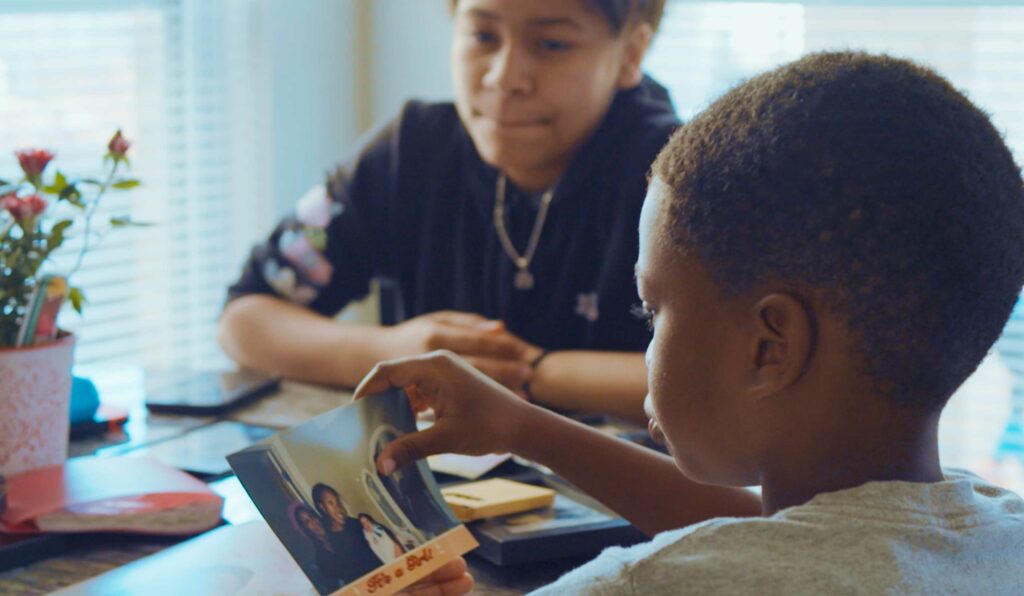
However, most South Carolinians—including the state’s Attorney General, Alan Wilson, a Republican—agree that the state’s judicial system is buckling under the weight of an extraordinary judicial backlog. Wilson is asking state lawmakers to expand his budget by $1.6 million dollars to help tackle the pile of serious criminal cases, including murders, that have been languishing for years. Against the backdrop of that backlog, state prosecutors, called solicitors, have a great deal of power over which cases make the trial docket. In Smith’s case, the prosecution proposed the trial date months in advance—but then introduced new documents within weeks of that date.
It is unclear what the prosecution hopes to prove with the entry of these documents, but they include medical records for Smith’s child. The Meteor has reviewed these records, which document her doctors’ visits from birth to the present; the most recent show that she was referred to and evaluated by an occupational therapist, who conducted a test to measure the child’s fine gross and fine motor skills—skills like grip on a spoon, object manipulation, physical reflexes, and other developmental milestones.
Advocates for parents like Smith have concerns about bringing records so long after pregnancy into a case. “The idea that your pregnancy-related conduct could be litigated when the kid is five or six, because, by some measure, they might not be hitting their milestones, feels so deeply problematic to me and not vested in any sort of understanding of causation versus correlation,” said Dana Sussman, the deputy executive director of Pregnancy Justice, a nonprofit who advocates for pregnant people caught in the criminal justice system.
The Meteor spoke to three occupational therapists, all of whom agreed that evaluations like the one listed above cannot diagnose why a child’s motor skills have progressed or been delayed.
“Children don’t meet milestones for all sorts of reasons and for no reasons at all,” Sussman notes. “I don’t think we know of a case right now that we’re working on that involves allegations that developmental milestones are not being hit, and therefore the mother deserves to be criminalized.”
As reported in the original piece, all American medical associations recommend abstaining from using cannabis and/or cannabinoid products during pregnancy and while breastfeeding, but the precise impact of marijuana use during pregnancy on the fetus and the child is both uncertain and under-researched. As outlined in the original story, Smith’s case is closely tied to the legal theory of fetal personhood and the ways the government is increasingly policing pregnant bodies (see the Alabama Supreme Court’s ruling on I.V.F. and so-called extrauterine children).
While Smith has been waiting for her day in court, she says, she’s been working at a nursing home and living with her mother and two older children. She tells The Meteor she hasn’t been allowed to see her youngest daughter since early November.
“This is half of a decade now of this back and forth, almost five years, and it’s just been continued and continued and continued,” Smith says.
Still, when asked where she sees herself in five years, she says her work with senior citizens, people who are at the end of their lives and have a long view of life, has given her both perspective and confidence. She plans to be a registered nurse.
Young People Are Two Times More Likely to Identify as LGBTQ+
 March 14, 2024 Evening Meteor readers, My child has been making little paintings of animals for the last few days, and I’ve decided to retire as a writer and live off of what is sure to be her prolific career as an artist. So I guess this is goodbye. I’ll remember to invite all of you to her opening night at The Met.  "THE LAST PENGUIN" BY THE ARTIST KNOWN ONLY AS V In today’s newsletter, we congratulate all the people who told Gallup they were queer. Plus, how Olivia Rodrigo is setting the standard for politically minded artists, and our weekend reading list. Shannon Melero  WHAT'S GOING ONWe’re here, we’re queer: Yesterday, Gallup released the findings of a major 12,000-person 2023 survey on sexual orientation and gender identity, revealing a sharp increase in young adults identifying as queer over the last few years. “LGBTQ+ identification in the U.S. continues to grow, with 7.6% of U.S. adults now identifying as…some other sexual orientation besides heterosexual.” This is a notable uptick from just four years ago, when just 5.6% of adults identified as LGBTQ+. So: Who’s most likely to say they’re LGBTQ+? First of all, young people. According to the data, Gen Z and millennials are twice as likely to identify as LGBTQ+ than older generations.  And the rise is also being driven by women. Among Gen Z respondents—the group who most self-identified as LGBTQ+—women were almost three times as likely as men to do so (28.5% of them did, vs 10.6% of men). The report also includes an important note: “The gender differences reported…do not account for the nonbinary population.” We’ll have to wait for further surveys to understand how the roughly 1% of Americans who consider themselves nonbinary identify. This is exactly the kind of data that rankles conservative lawmakers, and they’re likely to use it as a prime example of the degradation of core American values (life, liberty, and the pursuit of heteronormativity). But given the documented consequences of being unable to live life on your own terms—from depression and loneliness to suicide—the fact that so many young (and youngish) people are identifying as LGBTQ+ suggests tremendous progress in how comfortable they feel. Previous research suggests Gen Z is better equipped with “a language of gender” and peer support than previous generations were. So while extremists might see these numbers as proof of the “gay agenda,” they can also be seen as proof of societal progress—which couldn’t come at a more urgent time, considering the dark cloud of violence towards LGBTQ+ teenagers stoked by fearmongering adults like Moms for Liberty, Libs of Tiktok, and more. And the death of Nex Benedict, a transgender teenager in Oklahoma who died in February after a physical altercation at his school, shows just how fatal that violence can be. (An early autopsy report has ruled Benedict’s death a suicide, an outcome that is all too common among transgender youth—no doubt connected to the rise of anti-LGBTQ legislation, schools that don’t punish bullies, and more) Against that backdrop, a question for all of us: Now that we know so many young people are queer, what are we doing to protect them? If you or someone you know is struggling with suicidal thoughts you can reach a counselor via The Trevor Project by clicking here or texting 678-678. AND:
 FRIENDLY REMINDER!As I mentioned on Tuesday some of us at The Meteor will be cobbling together our limited knowledge of the inner workings of women’s college basketball and making official NCAA brackets. But wouldn’t it be more fun to do it with our readers? Selection Sunday is THIS weekend so put your women's bracket together and send a PDF of it to [email protected]. As the tournament progresses, I’ll track everyone’s picks until there’s only one bracketologist left standing. That lucky duck (get it? DUCK! Yes, I am placing Oregon high on my bracket don't judge me.) will get a fabulous Meteor tote and bragging rights. The cut-off for sending in your brackets is the evening of March 20, we're closing up the party after that. May the three-pointers be ever in your favor.  ME TO MY COWORKERS IF I WIN THIS THING  WEEKEND READING 📚On not calling the cops: In 2020, a young girl in New Orleans reported that she had been raped by a friend and then pressured to complete a rape kit. But shortly after that horrific day she was sexually assaulted again and this time her assailant was the police officer who escorted her to the hospital for that first rape kit. (The Washington Post) On the lookout: The internet wildfire surrounding Catherine, Princess of Wales, has shed light on a larger issue of how the general public can feel such strong ownership over one woman’s body. (The Atlantic) On knowing thyself: “The moral case for letting trans kids change their bodies.” (Intelligencer)  FOLLOW THE METEOR Thank you for reading The Meteor! Got this from a friend? Subscribe using their share code or sign up for your own copy, sent Tuesdays and Thursdays.
|
![]()





